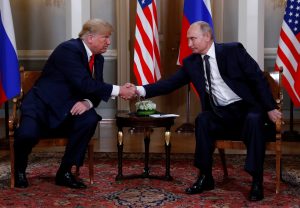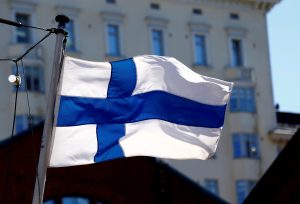
By Jeff Mason and Andrew Osborn
HELSINKI (Reuters) – U.S. President Donald Trump sat down with Vladimir Putin for a long-awaited summit on Monday saying he wanted good relations with Russia, after blaming Washington’s own past “foolishness and stupidity” for the countries’ hostile ties.
Trump opened the meeting with warm words for Putin, seated next to the Russian leader in an ornate presidential palace in neutral Finland, and said it was a longstanding goal of his to improve the relationship between the two countries.
“I think we will have an extraordinary relationship. I hope so. I’ve been saying it, and I’m sure you’ve heard over the years, and as I campaigned, that getting along with Russia is good thing, not a bad thing,” he said.

U.S. President Donald Trump and Russia’s President Vladimir Putin shake hands as they meet in Helsinki, Finland July 16, 2018. REUTERS/Kevin Lamarque
But to Trump’s critics, the friendly words had already been overshadowed by an extraordinary denunciation of his own country’s prior policies, which Trump tweeted out hours before the summit.
“Our relationship with Russia has NEVER been worse thanks to many years of U.S. foolishness and stupidity and now, the Rigged Witch Hunt!” he tweeted before the summit began.
The Russian foreign ministry “liked” his tweet, and tweeted back: “We agree”.
Trump’s opponents at home were furious, with one Democratic congressman tweeting that Trump had turned the White House into “a propaganda arm for the Kremlin”.
Putin and Trump met alone apart from interpreters before a working lunch with aides. Trump said they would talk about a range of subjects, listing trade, the military, nuclear weapons and China.
But, at least in his public remarks at the outset, he mentioned none of the issues that have lately brought U.S.-Russian relations to the lowest point since the Cold War: Moscow’s annexation of territory from Ukraine, its support for Syria’s Bashar al-Assad, as well as Western accusations that it poisoned a spy in England and meddled in elections.
“Our relationship with Russia is strained because of the very malign actions he’s refusing to take Russia to task for,” tweeted Democratic U.S. Representative Gregory Meeks, a member of the House Foreign Affairs Committee. “Though relations were worse during the Cold War, at least then the US Presidency wasn’t a propaganda arm for the Kremlin.”
The Kremlin has played down expectations for the summit. It said it did not expect much from the meeting but hoped it would be a “first step” to resolving a crisis in ties.
“Presidents Trump and Putin respect each other and they get along well,” Kremlin spokesman Dmitry Peskov said. “There is no clear agenda. It will be determined by the heads of state themselves as they go along.”
While Trump has been abroad since last week, the special prosecutor investigating allegations that Russia interfered to help him win the 2016 presidential election indicted 12 Russians on Friday for stealing Democratic Party documents.

U.S. President Donald Trump, first lady Melania Trump, Finland’s President Sauli Niinisto his wife Jenni Haukio pose for a photo in Helsinki, Finland, July 16, 2018. REUTERS/Kevin Lamarque
“WHICH TEAM DO YOU PLAY FOR?”
Trump’s foes at home have been scathing about his apparent refusal to criticize Putin. His 2016 opponent Hillary Clinton tweeted: “Great World Cup. Question for President Trump as he meets Putin: Do you know which team you play for?”
Russia denies interfering in the U.S. presidential election. The state RIA news agency quoted a Russian source as saying Moscow was “ready to discuss, ready to undertake mutual obligations of non-intervention into internal matters”.
Trump has said he will raise the election meddling but does not expect to get anywhere. He has repeatedly noted that Putin denies it, while also saying that it is alleged to have taken place before he became president.
For Putin, that the summit is even happening despite Russia’s semi-pariah status among some Americans and U.S. allies is a geopolitical win.
The summit caps a trip abroad during which Trump sternly criticized NATO allies for failing to spend enough on their militaries and embarrassed British Prime Minister Theresa May by saying she refused to take his advice about how to negotiate Britain’s exit from the EU. He referred to the European Union itself as a “foe” in trade, and repeatedly criticized it.
In some of the strongest words yet reflecting the unease of Washington’s traditional allies, Germany’s foreign minister said on Monday Europe could not rely on Trump.
“We can no longer completely rely on the White House,” Heiko Maas told the Funke newspaper group. “To maintain our partnership with the USA we must readjust it. The first clear consequence can only be that we need to align ourselves even more closely in Europe.”
(Additonal reporting by Steve Holland in Helsinki and by Christian Lowe and Polina Devitt in Moscow; Writing by Andrew Osborn and Peter Graff; Editing by Angus MacSwan)









